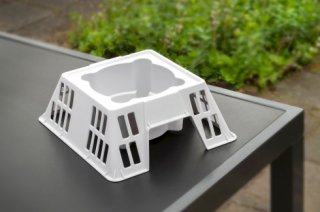
Project
APPS: developing new products with biobased PBS
The APPS project focuses on developing compounds based on biobased PolyButylene Succinate (PBS) for injection moulding. It involves a wide range of applications, including reusable horticultural crates and (luxury) packaging. The bio-PBS is based on Reverdia’s succinic acid.
Traditionally, PBS is a plastic based on building blocks (butanediol and succinic acid) from fossil resources. It is commonly used for applications in which bio-degradability is desired. Using the biobased succinic acid from Reverdia enables the development of a sustainable biobased PBS with an improved CO2 footprint without compromising the properties of the material.
"An important objective of the project is to develop plastics from renewable raw materials with a much wider scope for application," says project leader Karin Molenveld from Wageningen Food & Biobased Research. "This will increase the market potential of the plastic."
Preventing hydrolysis
Specific research topics in the project include durability, toughness, dimension stability, thermal and chemical stability and processing properties. This involves, among others, additives that prevent hydrolysis and improve durability. The project also studies nucleating agents which can be added to make materials transparent. Furthermore, mechanical properties can be enhanced using fillers, fibres or blends (for example with PLA).
"The project participants represent the entire value chain. This means that the results are immediately evaluated by the parties and manufacturers, allowing them to be applied faster and more easily." - Lawrence Theunissen of Reverdia.
The project is a collaboration of Wageningen Food & Biobased Research and the companies Reverdia, RPC Promens and Teamplast.
